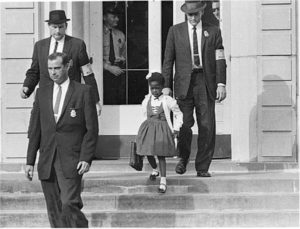
I saw the story of Timmia Williams on Wednesday, four days after I got the Sunday paper. During the week I read several newspapers on line. Sunday is different, I get the paper delivered to my front door bundled up and protected from snow or rain. In my hands I hold printed news of the nation and the world. I look forward to a leisurely breakfast, an extra cup of coffee and read my favorite sections. I start with the week in review, I love the letters to the ethicist that despite four year of big lies, people are still searching for moral clarity; I read about modern love, and work my way back to the first section of the New York Times. It takes me a couple of days to read the entire paper.
On Wednesday, a cloudy chilly day in upstate NY, I see a headline, Teacher Suspended After Racial Tirade tucked all the way on page 17 of the paper. I read the painful account of a high school student, Timmia Williams. Her story of a racially abusive teacher, while shocking, is not surprising. In the time of Covid-19 another virus, a social disease of racism rocked a somnambulant country. It was as though the biological unseen virus pulled, unplugged another one. Suddenly the racism virus refused to stay hidden from public view.
The pandemic has been knotted in the phenomenon of Zoom classes where a teacher brought the racism virus into Timmia Williams’ high school. Like most revelations about the brutality of racism her heartbreaking story came to light because like the brave 17-year-old Darnella Frazier recording the murder of George Floyd, Ms. Williams recorded as Howard Zlotkin, in class on landscape and design, abused his power. Zlotkin began with a verbal assault of BLM, defamed the memory of George Floyd yelling, “He’s not a hero, he is like a criminal.” He then singled out Ms. Williams and three other black girls assigning them a paper, “Why Black Lives Should Matter.” No other students were given that assignment. Timmia Williams refused to comply. Zlotkin was not the faint of heart teacher to give up an attack in progress, “Why? You can’t make a case for yourself? No, you can’t Timmia, that is why.” And “When Ms. Williams started to defend herself, Mr. Zlotkin cursed at her and later told her to ‘talk to the hand.’’
I had no idea that “Talk to the hand, or “tell it to the hand,” as I discovered, is a slang phrase associated with the 1990s and is a short hand for, “shut up.” Teachers like Zlotkin targeting adolescent girls is not new, nor is racism. Yet so much of glaring racism has gone unnoticed, silenced, hidden and denied in white America. In the year of the pandemic, however, it has become obvious that abuse of power is not limited to the police. While police officers have guns and display badges with the power of life and death for black people, endemic stress and suffering have existed in education, housing, and the workplace to diminish and damage the quality of life. Trauma permeates every corner of black experience, in stores, in parks, on the street, in the home, in churches and until recently has gone unseen by white America.
Our country has been organized on denial, we are all enculturated to participate in the silencing of racism, and teachers like Zlotkin and police officers like Chauvin have counted on it. They have also missed the 17-year-old girls’ courage to record the brutality psychological or physical. It was easy for schools to just ignore racism in the classroom, to silence students and parents’ complains. In the case of Ms. Williams, her parents contacted the William L. Dickinson High School in Jersey City and the Board of Education, and none responded. Ms. Williams realized that the only way she would be heard would be to take the video to NBC New York. Most of us would not be surprised to hear that suddenly the school and the Board found their voice, suspended the teacher with pay, and launched an investigation.
Jersey City America is everywhere. The school and the board thought, like in the “good old days,” that they could just ignore abusive racism. Ms. Williams fought back. In a democracy it should be the adults who protect children and ensure that justice is for all. For black America it has been a long fight in which young black girls, like Ruby Bridges and so many others after Brown v. Board of Education, went to school surrounded by shouting white mobs, way too young to be asked, then and now, to fight for racial justice. In a democracy Black parents should not be asking, “Is she safe in school today?”
On the day of the abuse in school, Timmia Williams got her acceptance letter from college. We applaud her courage to record and report. We thank her and all the brave youngsters who have already done so much. Let us learn from them and make sure that we, the grown ups in this country, are in front of the fight for racial justice.